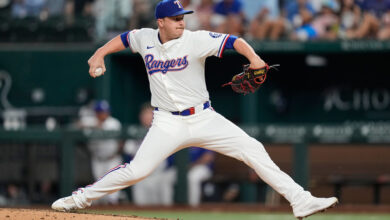
The Schwarber Effect: How Much Better is the Cubs’ Offense with Their Rookie Slugger in the Lineup?
Hey, kids, are you ready for a fun post based on anecdotal evidence? I know it’s a little frivolous and perhaps a bit irresponsible to draw conclusions about a player’s impact after only 28 games, but I just slid the last five-spot in my wallet into a $5 minimum video blackjack table, so writing about what Schwarber has meant to the Cubs actually represents an improvement in my decision making.
The first, and maybe simplest, way to judge Schwarber’s value resides in the middle of his name. In a very short time, the young man has contributed 1.4 more wins than a replacement player would have. If we extrapolate that out over 140 games, we’d get 7 WAR, which is basically MVP caliber. I could just end there and be satisfied with my very unscientific findings.
But just looking at WAR doesn’t tell us the whole story, and a question from Twitter got me thinking about how the rest of the team has responded around their young Khal. Just a few days ago, Kyle Hendricks said, “The whole lineup has taken over the mentality of how he goes about it.” Baseball is a very psychological game, and it’s possible for a player to make his presence felt with his attitude as much as his bat. With that in mind, one might say Schwarber’s got a great battitude.
Back to that question though, which was about how the Cubs have been hitting and scoring with and without Schwarber in the order. It was an interesting thought, as I had done my fair share of lamenting a lineup that had scored two or fewer runs far too often. Since mid-July, however, they’ve looked a lot better. That could just be from the respite of the All-Star break, or it could be the reemergence of the rookie slugger who has earned his way into an everyday role despite the lack of a permanent position.
In the 82 games the Cubs have played without Khal Schwarber, they averaged 3.71 runs and 7.91 hits (.83 home runs). But over the course of all 110 games played this season, they have averaged 3.95 runs on 8.13 hits (.91 homers). For those of you not possessed of strong mathematical skills, that means they’ve been better with Schwarber. How much better?
Well, in the 28 games in which the kid has been on the roster, the Cubs have scored 4.52 runs (21.8% increase) and have collected 8.45 hits (6.8% increase) and have hit 1.1 home runs (32.5% increase) per game. But he was only a sub in 5 of those games, so I wanted to look more closely at those 23 contests in which the kid’s bat had a bigger presence.
In games in which Schwarber has started, the Cubs average 4.96 runs, 8.82 hits, and 1.26 home runs, increases of 33.7, 11.5, and 51.8 percent, respectively. Sure, some of that has come from what is likely unsustainably high production from the former Hoosier, but it’s pretty evident that the team as a whole is appreciably better with him on it. Having a guy with a hot bad who’s also enthusiastic and willing to do whatever he can to help the team win just gets everyone feeling a little better.
Well, everyone but Jake Peavy, who took issue with Schwarber getting set in his batting stance and listening to his walk-up music. I don’t think Peavy took too kindly to the rookie staring him down either. But Schwarber gave no quarter and was unshaken by the notoriously hot-headed veteran’s treatment of him. This is the kind of guy you want on your team, whether you’re a player or a fan. Even as his production levels off, Schwarber will be a valuable part a squad that’s looking more and more like one that’s ready to compete.

